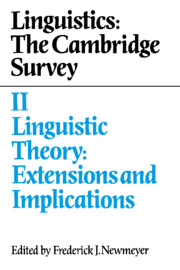Book contents
- Frontmatter
- Contents
- Contributors
- Preface
- 1 Extensions and implications of linguistic theory: an overview
- 2 Grammar and language processing
- 3 Grammatical principles of first language acquisition: theory and evidence
- 4 Second language acquisition and grammatical theory
- 5 Brain structures and linguistic capacity
- 6 Abnormal language acquisition and the modularity of language
- 7 Grammatical aspects of speech errors
- 8 Grammar and conversational principles
- 9 Discourse analysis: a part of the study of linguistic competence
- 10 Speech act distinctions in grammar
- 11 Computer applications of linguistic theory
- 12 Metrics and phonological theory
- 13 Grammatical theory and signed languages
- 14 The linguistic status of creole languages: two perspectives
- 14.I Creole languages and the bioprogram
- 14.II Are creoles a special type of language?
- 14.III A dialog concerning the linguistic status of creole languages
- Subject index
- Name index
- Contents of volumes I, III, and IV
9 - Discourse analysis: a part of the study of linguistic competence
Published online by Cambridge University Press: 08 February 2010
- Frontmatter
- Contents
- Contributors
- Preface
- 1 Extensions and implications of linguistic theory: an overview
- 2 Grammar and language processing
- 3 Grammatical principles of first language acquisition: theory and evidence
- 4 Second language acquisition and grammatical theory
- 5 Brain structures and linguistic capacity
- 6 Abnormal language acquisition and the modularity of language
- 7 Grammatical aspects of speech errors
- 8 Grammar and conversational principles
- 9 Discourse analysis: a part of the study of linguistic competence
- 10 Speech act distinctions in grammar
- 11 Computer applications of linguistic theory
- 12 Metrics and phonological theory
- 13 Grammatical theory and signed languages
- 14 The linguistic status of creole languages: two perspectives
- 14.I Creole languages and the bioprogram
- 14.II Are creoles a special type of language?
- 14.III A dialog concerning the linguistic status of creole languages
- Subject index
- Name index
- Contents of volumes I, III, and IV
Summary
Terminological preliminaries
‘Discourse analysis’ is without a doubt one of the most widely used and loosely defined terms in the entire field of linguistics. At least two reasons for this come to mind, one a positive one, the other a negative one. The positive one is that discourse, in all its many aspects, is a salient and important object of study in a large number of domains: it is hard to imagine a full account of human cognition, development, language, behavior, culture, interaction, creativity, pathology, or simulation that does not attend to discourse. The negative reason for the looseness of the term is that no one theory or account of discourse has had a wide or strong enough acceptance to have an imperialistic monopoly on it.
Not surprisingly then, the term ‘discourse analysis’ does not denote a unitary field of inquiry. That is, on the assumption that a field is defined by a common set of beliefs, a common methodology, and a common set of goals, ‘discourse analysis’ denotes many fields; the term has been and no doubt will continue to be used in different ways by sociolinguists, ethnomethodologists, ethnolinguists, psycholinguists, literary theorists, and computational linguists, among others, as long as they find the study of stretches of language relevant.
- Type
- Chapter
- Information
- Linguistics: The Cambridge Survey , pp. 164 - 182Publisher: Cambridge University PressPrint publication year: 1988
- 10
- Cited by



